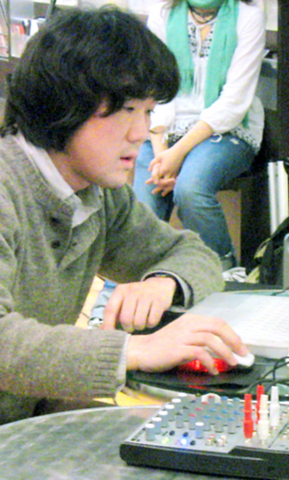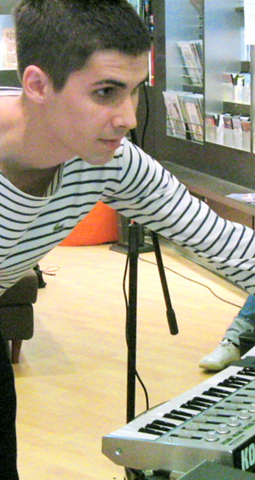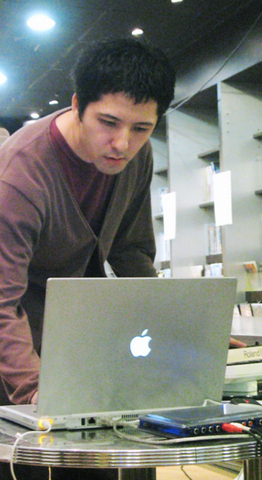What does your laptop mean to you? If you venture by NTU's Corridor Cafe tomorrow evening, you'll see four guys from Japan whose laptops serve as their artistic medium. Childish Music Concert, organized by Node Culture and Plop, is a multimedia production with a kiddish bent.
Featuring four Japan-based laptop electronica artists, the concert is aimed at kids, adults and "kidults" alike. The artists will work their aural and visual magic through a combination of acoustic instruments -- guitars, xylophones and toy instruments -- and electronic equipment -- laptops, projection screens, speakers, etc.
"Childish music," a small-but-worldwide trend in electronica, treats the ear to soft, sweet-sounding music that incorporates a variety of sound effects. The German record label Staugbold is planning to release a compilation CD later this month titled Childish Music. The CD will include tracks from two of the artists performing at NTU tomorrow night: Kazumasa Hashimoto and Lullatone.

Kazumasa Hashimoto, who encountered music at a young age and majored in composition at the Tokyo College of Music, creates pieces rich in imagery with a combination of acoustic instruments and electronic sounds. In addition to his contribution to the upcoming Childish Music he has two individual albums, Yupi and Epitaph.
Lullatone is the stage name of Shawn James Seymour. Seymour, who grew up in Kentucky but now lives in Nagoya, Japan. He likes to compose lullabies and play on toy instruments. His latest album is Little Songs About Raindrops.
The other two artists are Sora ("sky" in Japanese, the pseudonym of Kyoto's Takeshi Kurosawa) and Mondii. Another childhood musician, Sora was later influenced by the "intelligent techno" scene in the UK. His debut album, Re.sort was noted for its transformation of electronic glitches into sounds of nature, such as birds singing, insects humming and gentle waves hitting the shore.

Mondii (Nao Sugimoto) studied ethnic music in college. Once a sound designer for TV commercials, he is a "sculptor of clicks and beeps." Nao runs the Plop label and his own label Spekk.
A mini free-admission version of tomorrow's concert will be held tonight at 7:30pm at the I Prefer Concept Shop, 61, Lane 161, Dunhua S Rd, Sec 1, Taipei.

Performance notes:
What: Childish Music Concert (with artists Kazumasa Hashimoto, Lullatone, Sora and Mondii)
Where: Corridor Cafe in the NTU Sports Center (at the corner of Xinhai Rd and Xinsheng S Rd) (
When: Tomorrow at 7:30pm
Tickets: NT$600 (includes one drink) at the door

Eric Finkelstein is a world record junkie. The American’s Guinness World Records include the largest flag mosaic made from table tennis balls, the longest table tennis serve and eating at the most Michelin-starred restaurants in 24 hours in New York. Many would probably share the opinion of Finkelstein’s sister when talking about his records: “You’re a lunatic.” But that’s not stopping him from his next big feat, and this time he is teaming up with his wife, Taiwanese native Jackie Cheng (鄭佳祺): visit and purchase a

April 7 to April 13 After spending over two years with the Republic of China (ROC) Army, A-Mei (阿美) boarded a ship in April 1947 bound for Taiwan. But instead of walking on board with his comrades, his roughly 5-tonne body was lifted using a cargo net. He wasn’t the only elephant; A-Lan (阿蘭) and A-Pei (阿沛) were also on board. The trio had been through hell since they’d been captured by the Japanese Army in Myanmar to transport supplies during World War II. The pachyderms were seized by the ROC New 1st Army’s 30th Division in January 1945, serving

The People’s Republic of China (PRC) last week offered us a glimpse of the violence it plans against Taiwan, with two days of blockade drills conducted around the nation and live-fire exercises not far away in the East China Sea. The PRC said it had practiced hitting “simulated targets of key ports and energy facilities.” Taiwan confirmed on Thursday that PRC Coast Guard ships were directed by the its Eastern Theater Command, meaning that they are assumed to be military assets in a confrontation. Because of this, the number of assets available to the PRC navy is far, far bigger

The 1990s were a turbulent time for the Chinese Nationalist Party’s (KMT) patronage factions. For a look at how they formed, check out the March 2 “Deep Dives.” In the boom years of the 1980s and 1990s the factions amassed fortunes from corruption, access to the levers of local government and prime access to property. They also moved into industries like construction and the gravel business, devastating river ecosystems while the governments they controlled looked the other way. By this period, the factions had largely carved out geographical feifdoms in the local jurisdictions the national KMT restrained them to. For example,